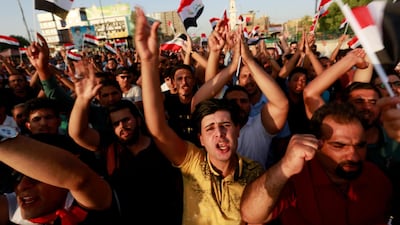Iraqi Prime Minister Haider Al Abadi sacked his minister of electricity on Sunday after weeks of protests against corruption and regular power cuts.
Mr Al Abadi's office said the leader sacked Qassem Al Fahdawi — whose departure was demanded by protesters — "because of the deterioration in the electricity sector".
Iraq has been gripped by three weeks of protests during which demonstrators have railed against power shortages, unemployment, a lack of clean water and state mismanagement.
The demonstrations - during which 14 people were killed - first erupted in the oil-rich but neglected southern province of Basra, home to Iraq's only sea port, before spreading north including to Baghdad.
Power shortages are chronic in Iraq, a country devastated by a conflicts including the war against ISIS, who held a third of the country before Mr Al Abadi declared victory over them in December.
Chronic, hours-long electricity cuts are a source of deep discontent among Iraqis, especially during the scorching summer months when demand for air-conditioning surges as temperatures soar past 50°C.
Since the toppling of dictator Saddam Hussein in 2003, Iraq has allocated in state budgets a total of US$40 billion (Dh147bn) to rebuild its power network, according to official figures.
But much of that has been siphoned off by politicians and businessmen in a country listed by Transparency International as the world's 12th-most corrupt.
A government official told AFP on Sunday that Mr Al Abadi had also ordered investigations launched into fake contracts.
Since 2003, more than 5,000 so-called "phantom contracts" have been signed in the public sector, according to Iraq's parliament.
During the same period, $228bn dollars have gone up in smoke due to shell companies.
______________
Read more:
Ayatollah Ali Al Sistani calls for new Iraq government to be formed as soon as possible
Iraq to put election officials on trial over fraud in May's poll
The leaderless protests of southern Iraq see years of neglect boil over
______________
The ministry of electricity has been a key one in previous governments.
At least two previous electricity ministers have been accused of corruption, including over fake contracts worth millions of dollars.
In 2010, one of Mr Al Fahdawi's predecessors, Karim Wahid, resigned after a wave of protests across central and southern Iraq against severe power rationing.
These shortages have forced Iraqis to buy electricity from private entrepreneurs who run power generators that can be seen on most street corners.
Electricity consumption has increased in Iraq since the 2003 US-led invasion that removed Saddam, as Iraqis make more use of household electronic equipment, including computers and mobile phones.
Iraqi officials say that a drop in oil revenue has meant less money in state coffers to rebuild the country's infrastructure. They also criticise Iraqis, who they say are not paying their utility bills.
The sacking of the electricity minister came a day after the country's elections commission, run by judges appointed after widespread allegations of fraud and irregularities in the May 12 general election, endorsed Mr Al Abadi's recommendations to sack five election officials.
In a statement issued on Saturday, the spokesman for the Independent High Elections Commission, Judge Laith Jabr Hamza, said the five were forced out over charges of "irregularities, manipulation and financial corruption".
They are the directors of the commission's offices in the provinces of Salaheddin, Anbar and Kirkuk, as well as offices for the Iraqi diaspora in neighbouring Jordan and Turkey. Judge Hamza did not elaborate.
The initial election results gave a bloc organised by Shiite cleric Moqtada Al Sadr the largest share, with 54 seats in the 329-seat parliament. It was followed by an Iran-backed bloc — made up of Shiite militias — which won 47 seats, and Mr Al Abadi's alliance, with 42 seats.

